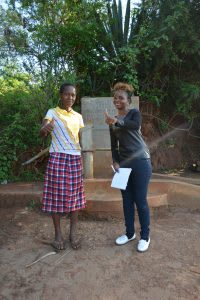A Year Later: Maiuni Hand-Dug Well

A year ago, generous donors helped build a hand-dug well for the Maiuni Self-Help Group in Kenya. Because of these gifts and our monthly donors, partners are able to visit project sites throughout the year, strengthening relationships with communities and evaluating the actual water project. These consistent visits allow us to learn vital lessons and hear amazing stories – we’re excited to share this one from our partner Mutheu Mutune with you.
Before this project was implemented last year, clean and safe water for drinking was scarce here. The only way one could reach water was by digging scoop holes in the sandy riverbeds or by buying from water vendors. It has been of great benefit to the members and non-members who use the water for drinking and for household chores.
After the training, most members are now treating their drinking water, and as a result waterborne diseases have drastically decreased. Some members have started vegetable plots and cash crop farming of green beans to sell to a company called Kenya Fresh. They now supply the neighboring markets with green maize and other vegetables. Health has improved, since this clean drinking water has also supplied enough water for successful harvests.
Stanley Ngosi is the secretary for Maiuni. He met us at the well to talk about how life has changed over the past year. He said, "Planting trees was a challenge for the people around here because water was scarce and this river used to dry up. Nowadays, our trees are surviving because even when the dam dries up, the well provides you with water throughout the dry season. Most members have irrigated their farms using this water and the crop yields have fetched money for them. The income received from these kinds of projects is used to meet basic needs like school fees, buying school uniforms, other clothes, food and such. The water is soft for washing clothes and we use little soap in doing our washing. The citrus fruits that I planted are almost mature and soon I’ll be getting an income. Some of the members use the water to make bricks, which they use in the construction of their homes."
 Beatrice Nduku is so grateful to have water nearby. "Before this project we used to waste a lot of time walking long distances. Distance has now decreased and time taken reduced to less than 30 minutes. I have used the water to establish a tree nursery at our home, and the survival has been good compared to before. At our home we have made bricks using the water, which in turn have been used to construct my brother’s house. Our home is now presentable because of better structures. Some contagious diseases which used to get transmitted to our livestock before no longer exist because our livestock don’t go for long distances in search for drinking water. I am now able to concentrate more in class, and I sleep enough sleep. I used to dread going home after school because it included a routine that I go fetch water. I would return very late and tired, which affected my concentration in class the following morning. That is a thing of the past now! I get home and find that my mother has already cooked supper for us, so I just eat and do my homework, then take a bath and sleep," she shared with a smile.
Beatrice Nduku is so grateful to have water nearby. "Before this project we used to waste a lot of time walking long distances. Distance has now decreased and time taken reduced to less than 30 minutes. I have used the water to establish a tree nursery at our home, and the survival has been good compared to before. At our home we have made bricks using the water, which in turn have been used to construct my brother’s house. Our home is now presentable because of better structures. Some contagious diseases which used to get transmitted to our livestock before no longer exist because our livestock don’t go for long distances in search for drinking water. I am now able to concentrate more in class, and I sleep enough sleep. I used to dread going home after school because it included a routine that I go fetch water. I would return very late and tired, which affected my concentration in class the following morning. That is a thing of the past now! I get home and find that my mother has already cooked supper for us, so I just eat and do my homework, then take a bath and sleep," she shared with a smile.
The Water Project and our partners are committed to consistent monitoring of each water source. Our monitoring and evaluation program, made possible by monthly donors, allows us to visit communities up to four times a year. Read more about our program and how you can help.
See The Water Project in Beatrice Nduku's Community »
